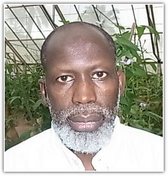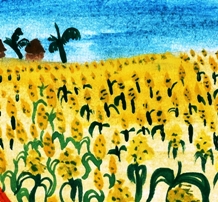Changes in staff and Product Delivery Coordinators
- Published Date
 We are very pleased to announce that Ousmane Boukar (pictured, profile here), of the International Institute for Tropical Agriculture (IITA), has accepted the position of Product Delivery Coordinator (PDC) for GCP cowpea projects in the Legumes Research Initiative. Phil Roberts of the University of California, Riverside, USA, has been the interim PDC, following the departure of Jeff Ehlers in mid-2012.
We are very pleased to announce that Ousmane Boukar (pictured, profile here), of the International Institute for Tropical Agriculture (IITA), has accepted the position of Product Delivery Coordinator (PDC) for GCP cowpea projects in the Legumes Research Initiative. Phil Roberts of the University of California, Riverside, USA, has been the interim PDC, following the departure of Jeff Ehlers in mid-2012.
We also welcome Patrick Okori, of the International Crops Research Institute for the Semi-Arid Tropics (ICRISAT). Patrick is the new GCP Product Delivery Coordinator for groundnuts, replacing Emmanuel Monyo, whose new duties as Tropical Legumes II groundnuts coordinator at ICRISAT do not enable him to continue his GCP PDC role.
We thank Phil, Jeff and Emmanuel for their exemplary service.
There will also be staff changes next month. Xavier Delannay, our Integrated Crop Breeding Theme Leader, Director of Research and Chair of the Integrated Breeding Platform Management Team, will be leaving GCP on 31 August 2013. Rajeev Varshney, our Comparative and Applied Genomics Theme Leader (on shared time with ICRISAT) will also be leaving GCP on 1 August 2013 to take on additonal responsibilities at ICRISAT.
We are grateful to Xavier and Rajeev, and we wish them both well in their new ventures.
Groundnuts, good news, genomics and God
- Published Date
 What could possibly tie these four together? Find out from Part 4 of our video series on groundnuts, where Soraya Leal-Bertioli (EMPBRAPA, Brazil) says "...that hadn't happened for the last....God knows when!" She brings good news on dramatically rapid variety release to farmers: genomics-powered acceleration in groundnut breeding slashes the time between research to fortify groundnuts against disease and drought, and getting these improved varieties into the hands of farmers.
What could possibly tie these four together? Find out from Part 4 of our video series on groundnuts, where Soraya Leal-Bertioli (EMPBRAPA, Brazil) says "...that hadn't happened for the last....God knows when!" She brings good news on dramatically rapid variety release to farmers: genomics-powered acceleration in groundnut breeding slashes the time between research to fortify groundnuts against disease and drought, and getting these improved varieties into the hands of farmers.
Split into four parts for easy viewing, topics covered include the role of wild groundnuts in improving its cultivated cousin; work done – and being done – in Africa, Asia, America and Europe; capacity building and how researchers benefit – and learn – from each other in this network, but also candid views on some of the drawbacks that come with cross-continental collaborations.
Hear about this, and more in this groundnut video series that in addition to Soraya also features Danial Foncéka (CIRAD, Senegal), David Bertioli (Universidade de Brasilia, Brazil), Jean-François Rami (CIRAD, France) and the project's leader, Vincent Vadez (ICRISAT).
You can also read about our groundnut research, as well as join our online community of groundnut researchers (IBP website).
Stepping in from the cold with scientific touchstone – Sorghum reference set ‘reloaded’
- Published Date
 A CIRAD-led team has just completed a huge genetic study covering more than 3,000 sorghum ‘candidates’ to encompass sorghum’s broad diversity. Such studies ensure that genetic collections do not just sit on shelves and in the lab, but come out of cold storage, moving from purely conservation goals into practical use. CIRAD (Centre de coopération internationale en recherche agronomique pour le développement) reports that this recently completed study is one of the broadest on genetic diversity for a cultivated crop. GCP funded this work.
A CIRAD-led team has just completed a huge genetic study covering more than 3,000 sorghum ‘candidates’ to encompass sorghum’s broad diversity. Such studies ensure that genetic collections do not just sit on shelves and in the lab, but come out of cold storage, moving from purely conservation goals into practical use. CIRAD (Centre de coopération internationale en recherche agronomique pour le développement) reports that this recently completed study is one of the broadest on genetic diversity for a cultivated crop. GCP funded this work.
The resulting ‘reference set’ (a sub-sample derived from – and representative of – existing collections) will guide future genetic studies. Across the planet, there are many – and vast – collections of sorghum. However, their sheer size, dizzying variety, and divergent goals make it difficult to meaningfully study sorghum’s genetic diversity on a global scale for the benefit of agriculture to improve food security.
Sorghum is the world’s fifth most important cereal, whose centre of diversity is nestled in northeastern Africa. The researchers found that sorghum from West Africa, southern Africa and eastern Asia was the most homogenous and the best differentiated. On the other hand, with an average of 19 alleles per locus, sorghum from eastern and central Africa registered the highest allelic diversity.
The CIRAD team used 41 genetic markers in their study, and worked in concert with partners from the International Crops Research Institute for the Semi-Arid Tropics (ICRISAT), the Chinese Academy of Agricultural Sciences and Bioversity (all four are GCP Consortium members).
The microsatellite marker kit employed by the researchers can be used to characterise new sorghum material, which can now be easily compared to known genetic resources. It will therefore be a good stimulus for international sorghum research collaboration to utlise sorghum's genetic diversity to boost food security.
More details are on the IBP website and on the CIRAD website (French | English)
Links
Related journal articles
- Massive sorghum collection genotyped with SSR markers to enhance use of global genetic resources DOI: 10.1371/journal.pone.0059714
- Assessment of genetic diversity in the sorghum reference set using EST-SSR markers (in press). DOI: 10.1007/s00122-013-2117-6
- A reference microsatellite kit to assess for genetic diversity of Sorghum bicolor (Poaceae) DOI: 10.3732/ajb.1100548
GCP research and products
- Sorghum Research Initiative
- Comparative genomics for cereals, including sorghum
- Sorghum research products on our Product Catalogue
IBP website
- Join the online sorghum community
- Sorghum facts and figures
What's cooking in our kitchens?
- Published Date
So what have we been up to lately? Plenty! Here's but a selection of some of our exciting events...

Right now as we 'speak', the Integrated Breeding Multiyear Course (IB–MYC, launched in 2012) is at full sail, running its 2013 session for the South and Southeast Asia group all this week and next week, having covered for the Western and Central Africa group earlier in April, and with the Eastern and Southern Africa group slated for October 2013.
Last month, our Integrated Breeding Platform (IBP) held its annual meeting.
Prior to that in May was the annual gathering of our Tropical Legumes I (TLI) project. Presentations from the meeting are available from TLI Project Leader, This email address is being protected from spambots. You need JavaScript enabled to view it. .
Finally, the 'Grand Gathering Grandmother' of them all will be the 2013 GCP General Research Meeting (GRM) in September. The GRM is held once every two years, and the last GRM was in 2011 (with presentations also recently posted on SlideShare). We'll be posting information on the 2013 GRM at this page. GRM attendance is by invitation only.
Events aside, we've been feverishly beavering away on a bunch of new videos and stories, and we'll bring these to you as we finalise them. Therefore, please stay tuned! Meantime, we invite you to our 'cybrary' to view our videos and peruse our blogposts.
And if you haven't already done so, do also please subscribe to our e-newsletter, GCP News.
A LEAP forward for agriculture in Africa
- Published Date

The Norman E Borlaug Leadership Enhancement in Agriculture Program (LEAP) invites applications from students in sub-Saharan Africa (focus region).
Borlaug LEAP offers fellowships to enhance the quality of thesis research by postgraduate students from developing countries who show strong promise as leaders in the field of agriculture and related disciplines, conducting research on topics related to the US Government's global hunger and food security initiative, Feed the Future.
Deadline for receiving applicaitons: 14th June 2013, to be considered for fellowships beginning mid-September 2013 and 2014.
More details on the IBP website.


